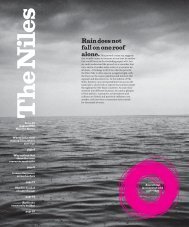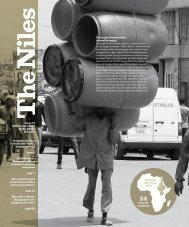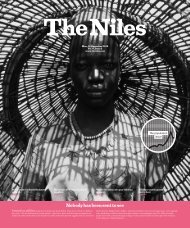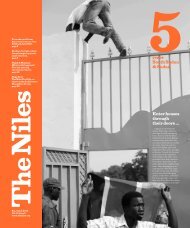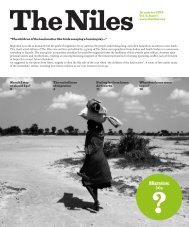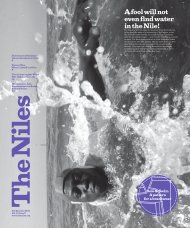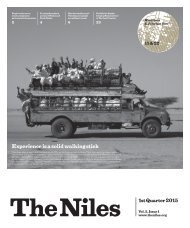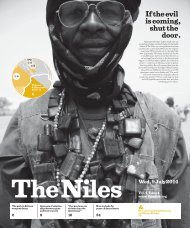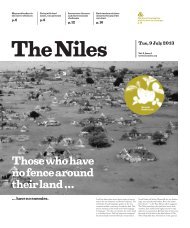When deeds speak, words are nothing
Speaking about sustainable development is easy. Acting sustainably is another matter. And now the evidence is unequivocal: Mankind’s impact on nature is causing the climate to change rapidly and drastically, threatening the environment and the very resources we need to survive. Aware that humanity is careening close to the edge, The Niles correspondents set out to explore where and how people in the Nile Basin region rethink. So much of their findings for now: We are an endlessly innovative species. Cooperation is our superpower. When deeds speak, words are nothing.
Speaking about sustainable development is easy. Acting sustainably is another matter. And now the evidence is unequivocal: Mankind’s impact on nature is causing the climate to change rapidly and drastically, threatening the environment and the very resources we need to survive. Aware that humanity is careening close to the edge, The Niles correspondents set out to explore where and how people in the Nile Basin region rethink. So much of their findings for now: We are an endlessly innovative species. Cooperation is our superpower. When deeds speak, words are nothing.
You also want an ePaper? Increase the reach of your titles
YUMPU automatically turns print PDFs into web optimized ePapers that Google loves.
re<think
the way
we communicate
Comment:
Stick to the facts, avoid
sparking conflict
Taking a closer look at the news coverage
of the Grand Ethiopian Renaissance
Dam in Sudan, Ethiopia and Egypt,
media outlets across the basin urgently
need to rethink their polarising reporting,
comments Elzahraa Jadallah.
Elzahraa Jadallah
Khartoum, Sudan
46
O
n this occasion, therefore, we, the peoples
of Ethiopia, call upon all the peoples of the
Nile Basin to turn over to a new page of cooperation
and solidarity. As we in Ethiopia
build this Millennium Dam with the aim
of eradicating poverty, let it be known to all
that it will also stand as an expression of our
commitment to the benefit of all the countries
of the Nile Basin.”
These were the words of the late Ethiopian
Prime Minister Meles Zenawi in April 2011
announcing the construction of the Grand
Ethiopian Renaissance Dam (GERD), also
known as the Millennium Dam.
After that speech, the eastern Nile Basin
region was never the same. Contrasting perceptions
and narratives about the dam were
fed to the Sudanese, Ethiopian and Egyptian
public during the last decade, and many aimed
to widen the gap instead of seeking unity.
Governments and politicians played a significant
role in creating the mess, but journalists
and media outlets perpetuated it. Although
the countries’ media is directed mainly by the
state and often leans towards nationalism, some
news coverage was inexcusable.
Irresponsible coverage
When we look at local news from Egypt,
for example, we see that it portrays Ethiopia’s
desire to utilise water resources as foreign
intervention or a deliberate attack on Egypt’s
national safety and water security. Some of
the reports were alarmist or even promoted
the spectre of violence. Words like “war” were
repeatedly mentioned, while overall, they
painted a dark image of the water security
situation in their country.
This, at times, reckless reporting of false
information created misunderstanding among
the people. During a regional training in 2017,
I spoke to local farmers. They had water issues
that they related to the GERD even though it
was still under construction by then, and the
reservoir filling hadn’t commenced. I asked
“Many aimed
to widen the
gap instead
of seeking unity.”
the farmer for the source of his information,
and he said it was in the news. To those
farmers, informed by local sources, the
GERD was the cause of their suffering.
Ethiopian media narratives have also
been adverse. National news had been charging
people with feelings of rage towards their
neighbours using every tool possible, such
as convincing the public that some of Ethiopia’s
droughts were caused by their inability to use
what “God” has given them. Sometimes Ethiopian
media outlets used provocative narratives,
such as mentioning the Ethiopian-Eritrean
war and linking it to the Egyptian intervention
to rally people against Egypt.
Another worrying example is the coverage
of the military cooperation between Sudan and
Egypt as a proactive preparation for war over
the GERD, raising fears and mistrust amongst
the Ethiopian public and widening the gap
between the historically close nations.
Going with the flow
In Sudan, media narratives long supported
Ethiopia in its attempts to utilise “their” water
resources. They listed all the benefits of the
GERD for Sudan, such as regulating the flow









